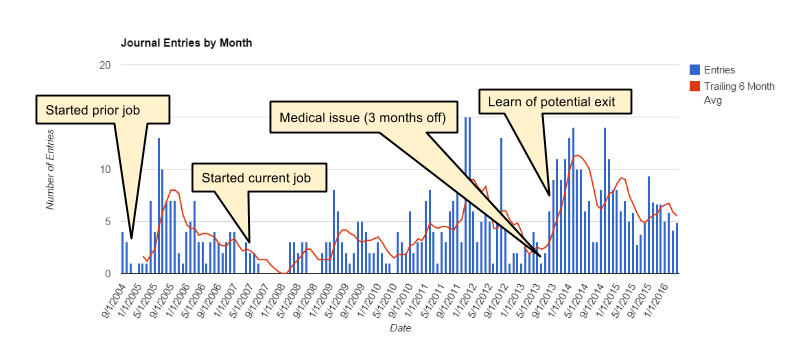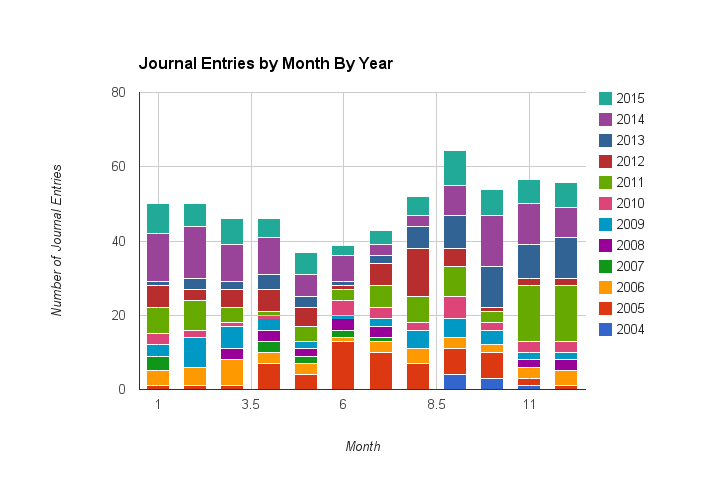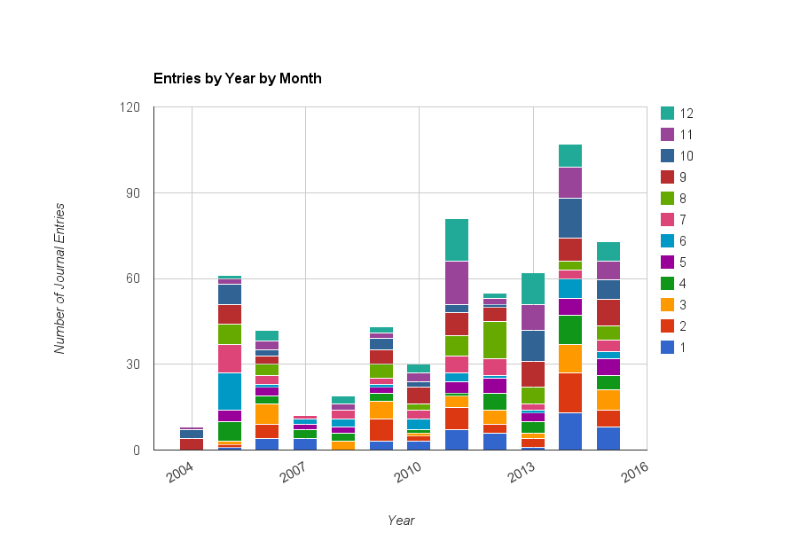Legthorn Brownboat wrote:I’m thoroughly enjoying the journal, so I think I’ll try and contribute in a fairly contrarian manner. Here’s my thoughts...
Thank you for your comments @Legthorn. I agree and you've articulated many of my thoughts more clearly than I could and your specific recommendations and observations around the relationship between improving engagement and satisfaction and specific work conditions are very relevant and accurate.
As far as money goes, the point is not about getting to X-times current level of spend -- that's merely a way of expressing it when I'm a little to shy to speak in actual numbers. But I believe we're saying the same thing -- as "burnt out" (whatever that means) as I feel at my current job, I don't expect to be paid anywhere close to this rate again, so I want to take full advantage ("survive") of the situation and need to do whatever I can to keep myself from doing something I'd regret.
It's been quite some time since I've shifted into "survive mode." I believe I'm at zero risk of being fired (but one should never be too smug about this). The real risk is myself and my own tolerance to stick it out. Things have been crazy since the company was acquired. I agree that reducing load and better consolidating blocks of time would likely yield a significant improvement in my mood. Work goes through cycles where I can do this and you're absolutely right that it yields much higher satisfaction and engagement. The unfortunate thing is that I don't feel that I'm in control of my workload and time on the job. This is something I have to somehow improve.
Your observations about contentedness and specific working conditions got me thinking. How I could use some existing data to demonstrate correlations between happiness and other factors in my life? I believe I know some of these (from intuition and memory) but could use some data (even if fuzzy) to back my intuitions up, or discover new correlations? (Note: I don't generally quantify myself. I realize this will seem obvious and rudimentary for any QS followers).
Quantifying My Past Happiness
Since the point of this journal is really about my mental, rather than financial, state I've decided to look at some data I have to try to quantify and predict my mental mood and happiness. Over the past 10 years I've privately journaled as an outlet. Often they're short (some entries are just simply "AAARRRRGGGGGHHHHHH!!!!!") to get things out, sometimes they're long. But one thing for sure is that when I journal it generally means I'm discontent. I'm either A) unhappy and complaining (almost exclusively about my job) or B) determined to improve my life in some specific way (not exclusively related to work) and writing about progress. Either could be considered a form of discontent, where the former is a negative way of dealing with it (just complaining) and the latter a positive method (trying to change things for the better). For the purpose of this exercise I have not bothered to categorize entries (yet).
Using number of journal entries as a proxy for happiness (higher numbers imply lower levels of happiness) I decided to try to do some very simple analysis and prediction.
The first graph plots number of journal entries per month over 10 years (note: 12 months of data beyond March 2015 is prediction).

Here is the same data by month, by year. The seasonality becomes very evident.

And finally the data by year, by month. The upward trend over time is evident (remember: after March 2015 is a projection)

A few observations and notes I made:
- There is clearly a honeymoon period after each job transition. I became dissatisfied with my prior job much more quickly than I did my current job
- Obviously seasonality plays a significant role in my mood. Of course I already knew this, but seeing it in numbers helps remind me that I'm at one of my lower points right now. Accounting for 2005 mostly being "positive" entries upon spot checking, seasonality is likely more pronounced than shown here.
- There is a clear upward trend over the years, especially from 2007 through now. Although 2011 appeared to be an unhappy year, a spot check shows that many of the entries are of the "B" type (attempting positive life changes). If I accounted for this there would be an even more pronounced, steady upward trend from 2007 through present.
- I journaled less when I took significant time off to deal with a very major family medical issue (which turned out well) than when I was working and was immediately discontent when I returned. I don't know that I was 'happier' but I can tell you in many ways it was less stressful than equivelent tim eon the job. This data point is probably the most telling one for me.
- I became significantly less happy when I learned of the potential exit event for the company. This is partly due to knowing where the finish line is, and partly due to unavoidable changes that began to occur within the organization.
- 2015 is off to a better start than 2014. I attribute this to having become somewhat acclimated to the new reality and increasingly having come to terms with the golden handcuff situation. Using the relative improvement in the first quarter of 2015 over 2014 I've modeled 2015 by applying adjustments to 2014 data.
- Initially I wished i had data going back to my first job and education. But I had no reason to journal then -- the lack of data from college and early working years actually indicates a "0" reinforcing my assertion that I really was happier then (not just being nostalgic). If I could plot free time vs. working time there would most certainly be a inverse correlation as well (I wish I had that data).
So after careful examination of the data I've come to the following conclusion:
I have to effing get out of this job and start living a life of freedom again, once I suck out every last dollar that I deserve! In all seriousness, I believe it does validate my belief that throughout working life I've become increasingly dissatisfied and am overdue for a significant change and a greater degree of freedom. Although I've decided to remain locked into the golden handcuffs for a while, I know that day is coming and I sincerely believe I'll be far happier then.


